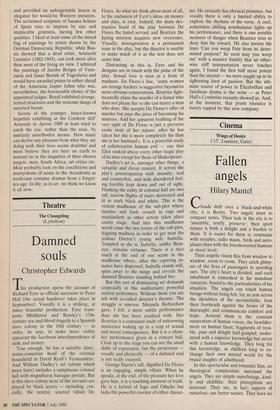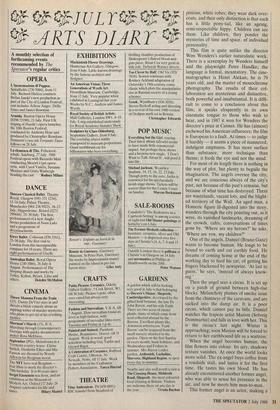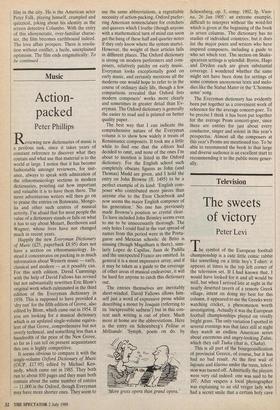Cinema
Wings of Desire ('15', Lumiere; Gate)
Fallen angels
Hilary Mantel
buds drift over a black-and-white city; it is Berlin. Two angels meet to compare notes. Their task in the city is to 'assemble, testify, preserve'; their spirit nature is both a delight and a burden to them. It is easier for them to commune with steeples, radio masts, birds and aero- planes than with the foreshortened humans at street level.
Their angelic vision flits from window to window, room to room. They catch glimp- ses of the lives of passengers in speeding cars. The city's heart is divided; and each inhabitant is enmeshed in his mundane concerns, bound to the particularities of his situation. The angels can touch human beings without being felt; lay an arm across the shoulders of the inconsolable, lean their foreheads against the brows of the distraught, and communicate comfort and hope. Around them is the . constant susurration of human voices, the bewilder- ment on human faces, fragments of trou- ble, pain and delight half-grasped, under- stood with a superior knowledge but never with a human knowledge. They long for this knowledge, as children long to ex- change their own mental world for the brutal insights of adulthood.
In this spectacular and romantic film, no theological complexities surround the angels. They are simple superbeings, kind- ly and childlike: their perceptions are innocent. They are, in fact, aspects of ourselves: our better nature. They have no pinions, white robes; they wear dark over- coats, and their only distinction is that each has a little pony-tail, like an ageing, semi-respectable hippy. Children can see them. Like children, they ponder the mysteries of time and space, of individual personality.
This film is quite unlike the director Wim Wenders's earlier naturalistic work. There is a screenplay by Wenders himself and the playwright Peter Handke; the language is formal, incantatory. The cine- matographer is Henri Alekan; he is 79 years old, and the master of monochrome photography. The results of their col- laboration are mysterious and distinctive, both powerful and insubstantial. It is diffi- cult to come to a conclusion about this film; it speaks eloquently in its own cinematic tongue to those who wish to hear, and in 1987 it won for Wenders the director's prize at Cannes. He has (almost) eschewed his American influences; the film is European to a fault. At times — to judge it harshly — it seems a piece of mannered, indulgent emptiness. It has more surface than substance, more technique than theme; it feeds the eye and not the mind.
For most of its length there is nothing in the way of plot, but plenty to beguile the imagination. The angels oversee the city, and we are conscious always of the city's past, not because of the past's remains, but because of what time has destroyed. There are wastelands, vacant lots, and the blight- ed territory of the Wall. An aged man, a Homeric figure ill-digested into the story, wanders through the city pointing out, as it were, its vanished landmarks, dreaming of the crowds, cafés, conversations of times gone by. 'Where are my heroes?' he asks, 'Where are you, my children?'
One of the angels, Damiel (Bruno Ganz) wants to become human. He longs to be bound to earth and eat earthly food. He dreams of coming home at the end of the working day to feed his cat; of getting his fingers blackened by newsprint. 'At last to guess,' he says, 'instead of always know- ing.'
Then the angel sees a circus. It is set up on a patch of ground between high-rise blocks. Melancholy plumes of smoke issue from the chimneys of the caravans, and are sucked into the damp air. It is a poor circus, which cannot pay its bills. Damiel watches the trapeze artist Marion (Solveig Dommartin) and falls in love with her. This is the circus's last night. Winter is approaching; soon Marion will be forced to return to her earthbound life as a waitress.
When the angel becomes human, the film flowers into colour. Its airy, shadowy texture vanishes. At once the world looks more solid. The ex-angel buys coffee from a roadside stall, and tastes it for the first time. He tastes his own blood. He has already encountered another former angel, who was able to sense his presence in the air; and now he meets him man-to-man.
This former angel is an actor, making a film in the city. He is the American actor Peter Falk, playing himself, crumpled and quizzical, joking about his identity as the screen detective Columbo. With the entry of this idiosyncratic, over-familiar charac- ter, the film becomes earthbound indeed. The love affair prospers. There is resolu- tion without conflict, a facile, unexplained optimism. The film ends enigmatically: To be continued. . .
















































 Previous page
Previous page